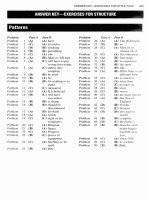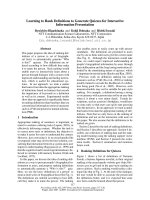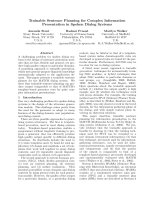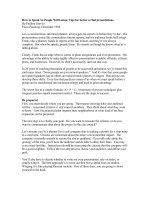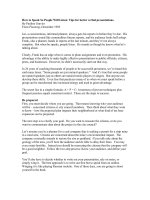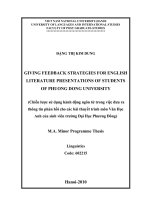Gina Vincent Adapted PPT for February 26th presentation
Bạn đang xem bản rút gọn của tài liệu. Xem và tải ngay bản đầy đủ của tài liệu tại đây (344.16 KB, 64 trang )
Financial Exploitation
Gina Vincent
Community Affairs Specialist
FDIC
Objectives
• Recognize and reduce the risk of financial
exploitation
• Guard against identity theft
• Plan for unexpected loss of the ability to
manage your finances
Money Smart for Older Adults
2
Objectives (cont.)
• Prepare financially for disasters
• Find other helpful resources on managing
money and reporting financial exploitation
Money Smart for Older Adults
3
Why are older adults and individuals
with disabilities at risk?
•Have regular income and accumulated
assets
•Are trusting and polite
•Are lonely and socially isolated
•Are vulnerable due to grief from the loss of
a spouse, family member, friend, or pet
Money Smart for Older Adults
4
Why are older adults and individuals
with disabilities at risk?
•Are unfamiliar with managing financial matters
•Are unprepared for retirement and the potential loss of
financial decision-making capacity
•Have cognitive impairments
•Are receiving care from a person with substance abuse,
gambling or financial problems, or mental health issues
•Are dependent on a family member, caregiver or another
person who may pressure them for money or control of
their finances
Money Smart for Older Adults
5
Examples of Financial Exploitation
• Financial power of attorney (POA) or
fiduciary abuse
• Theft of money or property by caregivers and
in-home helpers
• Investment fraud
• Lottery and sweepstakes scams
Money Smart for Older Adults
6
Examples of Financial Exploitation
(cont.)
• Telephone scams
• Computer/Internet scams
• Identity theft
• Reverse mortgage proceeds fraud
• Contractor fraud and home improvement scams
Money Smart for Older Adults
7
Who Could Be an Abuser?
•
•
•
•
•
•
•
•
Family members and caregivers
Friends, neighbors or acquaintances
Telephone and mail scams
Financial advisers
Internet scams
Home repair contractors
Medicare scam operators
Others
Money Smart for Older Adults
8
Why isn’t Exploitation Reported?
• Shame and embarrassment
• Loyalty to a family member or caregiver
• Fear of retaliation or not being believed
• Dependence on the abuser
• Denial
• Self-blame
• Lack of awareness
Money Smart for Older Adults
9
Who Can Help?
Adult Protective Services
Find contact information at www.eldercare.gov or
call 1-800-677-1116
Federal Trade Commission (FTC)
For cases of identity theft, contact the FTC at
www.ftc.gov/idtheft or call 1-877-IDTHEFT (4384338)
Money Smart for Older Adults 10
Who Can Help? (cont.)
Federal Deposit Insurance Corporation
For concerns about an FDIC-supervised financial institution,
complete a customer assistance form at:
www2.fdic.gov/starsmail/index.asp
Or call: 1-877-ASK-FDIC
Police
Call 911 if the situation is threatening or the person is in danger.
If you believe a crime has been committed, file a police report.
Money Smart for Older Adults 11
What is a Power of Attorney?
A legal document that allows someone else to
handle your finances on your behalf
•Appoints a substitute decision-maker if you are
unable to act on your own
•Avoids the need for a court-appointed guardian
•Is relatively inexpensive; using a lawyer is advisable
Money Smart for Older Adults 12
Power of Attorney: Risks
• Pressure to grant more authority than you
wish
• Misuse of your funds
• Unauthorized actions – gifts, changes to
beneficiaries
Money Smart for Older Adults 13
Power of Attorney:
• Durable – remains effective even if maker
becomes physically or mentally incapacitated
• Talk to an attorney for help in making a POA
that is appropriate for your circumstances
Money Smart for Older Adults 14
Power of Attorney: Safeguards
• Trust but verify.
• Avoid appointing anyone with substance abuse, gambling, or
who mismanages money.
• Tell others about your POA.
• If needed, change, cancel, or revoke the POA.
• Avoid appointing hired caregivers/helpers.
• Beware of new “best friends” who offer to manage your
money.
Money Smart for Older Adults 15
Tip: Plan Ahead!
A durable power of attorney is a very important
tool in planning for financial incapacity due to
Alzheimer’s disease, another form of dementia, or
other health problems.
Money Smart for Older Adults 16
Power of Attorney: If You Are a Victim
Report financial exploitation immediately to Adult
Protective Services or your local law enforcement
agency.
Money Smart for Older Adults 17
Abuse by Caregivers and In-Home
Helpers
Family members and caregivers are common
perpetrators of elder financial exploitation.
Money Smart for Older Adults 18
Caregiver: Safeguards
• Secure your valuables, such as jewelry
• Secure private financial documents (checks, financial
statements, credit cards, etc.)
• Require receipts for purchases
• Monitor bank accounts and telephone bills
• Consider setting up:
̶ Automatic bill pay systems
̶ Transaction alerts
Money Smart for Older Adults 19
Caregiver: Safeguards (cont.)
• Do not let hired caregivers/helpers open your mail, pay your
bills, manage your finances.
• Never promise money or assets after you die in exchange for
care now.
• Never lend money or personal property.
• Don’t put persons other than your spouse/life-partner on the
title to your home.
Money Smart for Older Adults 20
Investments: Fraud and Abuse
• Misleading senior certifications/designations
• Ponzi schemes
• Promissory notes
• Unscrupulous financial advisers
• Affinity fraud
• Internet fraud – the “Dot-Con”
• Inappropriate or fraudulent annuities
Money Smart for Older Adults 21
Investments: Safeguards
• Check out the financial adviser.
• Don’t base your trust on appearances or the sound
of a voice.
• Take time to understand your choices.
• Say “no” to pressure.
Money Smart for Older Adults 22
Investments: Safeguards (cont.)
• Be wary of salespeople who prey on fears or
promise returns that seem “too good to be true.”
• Ask for a written explanation.
• Shop around and get a second opinion.
• Say “no” to financial advisers who tell you to leave
everything in their care.
Money Smart for Older Adults 23
Investment: Safeguards (cont.)
• Stay in charge of your money or enlist a trusted third
party.
• Make checks payable to a company or financial institution,
never an individual.
• Retain and maintain account statements and
confirmations.
• Document all conversations with financial advisers.
Money Smart for Older Adults 24
Investments: Pointers
• Have at least six-months living expenses readily available
before you invest.
• Understand your investment. Attend classes, seminars, or
check business references in the library.
• Be aware that some “free seminars” are marketing
techniques.
• Understand the risks.
• Make sure your financial adviser understands your
objectives and risk tolerance.
Money Smart for Older Adults 25

